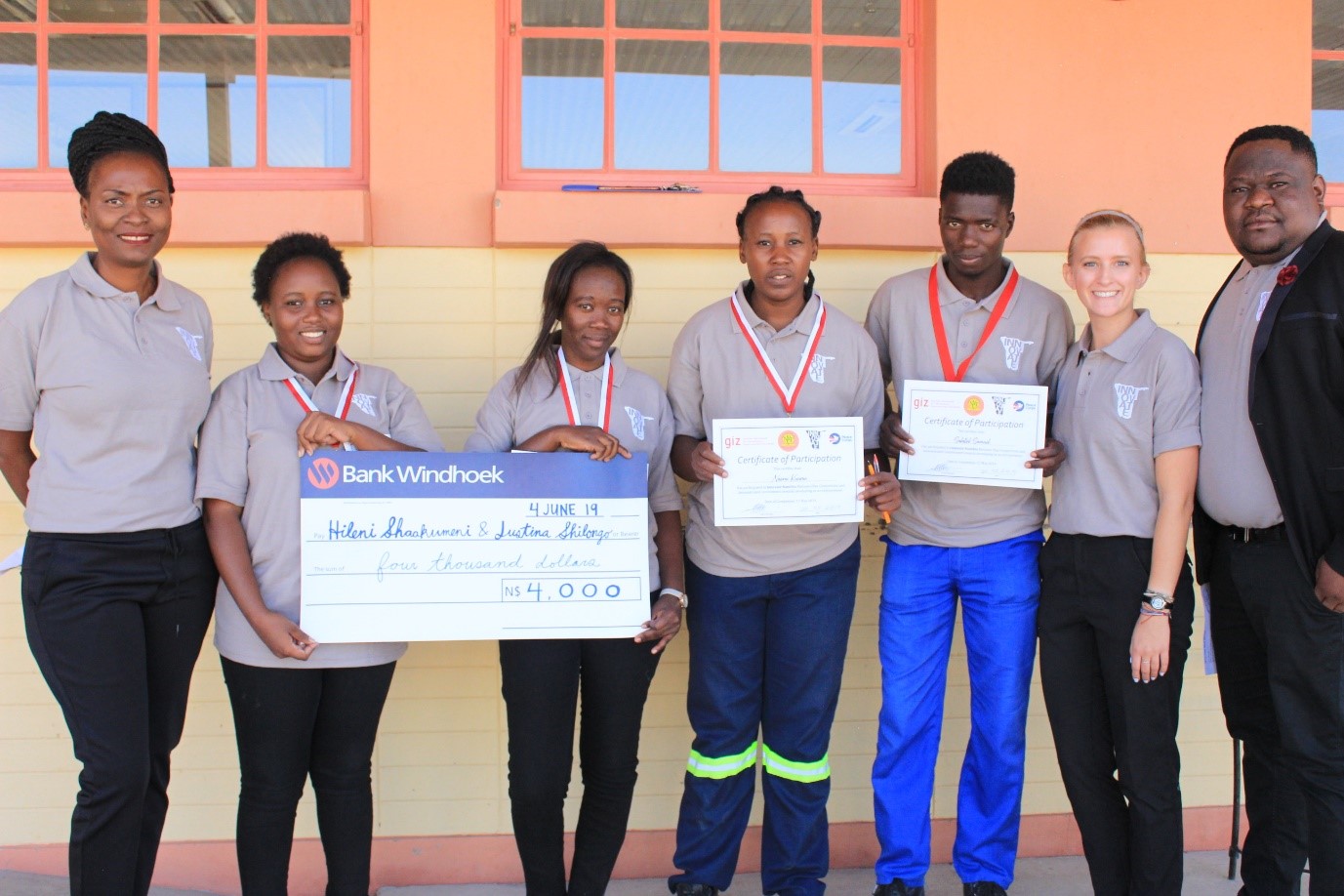
![]()
Institution: Nakayale Vocational Training Centre (NVTC)
High youth unemployment rates and a market lacking viable job opportunities even for TVET graduates has resulted in the need for job creation and entrepreneurship among TVET graduates. Innovate Namibia was designed to improve the entrepreneurial mind-set of vocational skills trainees, to create businesses that meet the needs and wants of their communities. Nakayale Vocational Training Centre (NVTC), one of the public vocational training centres under the Namibia Training Authority, leads the programme; which targets trainees of all levels and trades. Nakayale VTC successfully ran the inaugural and pilot program in May 2018. This year (2019) the program was expanded to include the other 2 VTCs within the 3 Hub Centres and is currently set to run it annually. The final competition for 2019 will be in August in which top 9 business plans from the three respective Centres will pitch their ideas to the jury for the grand prize.
Our Approach
Innovate Namibia targets youth age 18-35 currently studying any of the trades offered at a Vocational Training Centre. Instead of a stand-alone business plan, Innovate Namibia combines short courses, one on one mentorship, and advanced training to groom trainees for the competition and foster a sense of excitement and innovation. This framework is instrumental in the success of Innovate Namibia because it trains participants to look for potential areas for innovation within or outside their respective trades in which they are prepared to pitch their idea in front of a jury.
The success of this program is a direct result of the engagement with trainees and supporting events as outlined below. These additional events are vital to the success of the competition because it provides multiple opportunities for trainees to learn, develop their business plan, and hone their entrepreneurial mindset.
The activities of Innovate Namibia include the following:
Business Bootcamp: General training is provided to all trainees, including an introduction to the business plan format and trainees are encouraged to think about real world problems in or outside their trades.
Begin Business Training: Interested individuals start writing their business plans and developing their ideas.
Business Finance Training: Once the initial business plan is written, a business financial training is offered so that they are trained on how to do their business finances, cost and pricing.
Business plan and application deadline: All business plans are due for review
Mentoring: Once interested individuals have come forward, the mentorship process begins and continues over the entire course of the competition; this guides them to express their ideas and find ways to differentiate their business. Each of the top 3 plans from the centre are continuously improved based on feedback from the judges.
Key Results
- Two competitions to date (2018 & 2019)
- 3 TVET centres involved: Nakayale, Eenhana, & Valombola VTC (2019)
- 50+ participants in 2019
- N$25,000 in startup capital awarded to winners in all 3 Hub VTCs
- 2 businesses started as a direct result of initial competition (2018)
- 1st place: started a bakery in the village that not only provides breads and standard baked goods but gourmet cakes and breads, something that is sorely lacking from the Namibian market
- Runner Up: Traditional Oshiwambo Breads, this student uses this business as a means to support herself and fellow trainees, baking and selling traditional bread products.
Lessons Learnt (Success Factors & Challenges)
Success Factors
- Having prize money was a good motivator for trainee engagement.
- Financial support, in terms of event logistics, as well as participation and support by staff, was crucial for success.
- The supporting framework around the competition allowed for successful participant presentations as well as continued mentoring throughout and following the competition.
- Assistance is offered to register their business names with the Ministry of SME, Trades, and Industrialization.
Challenges
- Sponsors for cash prizes, generating trainee interest, and stakeholder engagement.
- Generating interest from trainees varied significantly between the centres and was highly impacted by the number of trainees at a given centre; this was addressed through targeted advertising and multiple points of contact with the trainees through posters, announcements.
Moving Forward
- Emphasis on being placed on entrepreneurship as an ongoing journey


